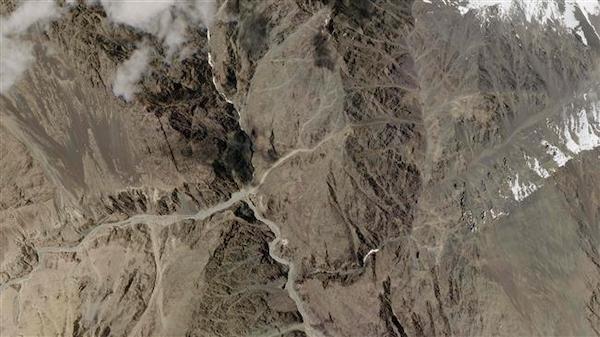
This handout satellite image, taken on June 16, 2020 and released by 2020 Planet Labs, Inc., shows Galwan Valley, which lies between Chinas Tibet and Indias Ladakh. (Via AFP)
India has warned China against making "exaggerated and untenable" territorial claims to a border area that was recently the scene of a deadly clash between the two sides.
Twenty Indian soldiers were killed in a clash in the Galwan Valley, a precipitous and rocky border area that lies between Chinas Tibet and Indias Ladakh regions, on Monday night. Each side blamed the other for the incident.
Beijing has not confirmed any Chinese casualties, but Indian media have quoted officials as saying that at least 45 people lost their lives or sustained injuries on the Chinese side.
The clash was the deadliest conflict between India and China in 45 years.
A Chinese military statement said on Wednesday that China "owns sovereignty over the Galwan Valley region."
Reacting to the statement, Indian Foreign Ministry spokesperson Anurag Srivastava said the foreign ministers of the two countries had had a phone conversation on the developments and "agreed that the overall situation should be handled in a responsible manner."
"Making exaggerated and untenable claims is contrary to this understanding," Srivastava said in a statement.
Moreover, Indian Foreign Minister Subrahmanyam Jaishankar accused China of building a structure in the Galwan Valley, which he called a "premeditated and planned action that was directly responsible for the resulting violence and casualties."
Jaishankar underlined that the measure would have "serious repercussions" for Indias relationship with China, but that both sides were committed to reducing tensions in the Himalayan region.
Chinese Foreign Minister Wang Yi, for his part, warned New Delhi not to underestimate Chinas determination to safeguard what he called sovereign Chinese territory, and called on India to conduct a thorough investigation and "harshly punish" those responsible for the recent conflict.
Wang also said that "mutual respect and support serves our long-term interests" as the two neighbors were trying to realize their full development.
The clash has fanned anti-Chinese sentiments in New Delhi, with an Indian confederation of small and midsize companies demanding a boycott of 500 Chinese goods, including toys and textiles. The call for the boycott followed protests Wednesday in New Delhi, where demonstrators destroyed items they said were made in China while chanting "China get out!"
The two Asian heavyweights have been in a long-time dispute over the Line of Actual Control frontier that divides their long joint border.
In 1962, India and China fought a brief war. Further clashes followed in 1967 and 1975.
SOURCE: PRESS TV
LINK: https://www.ansarpress.com/english/18675
TAGS:






























 online news tv
online news tv




